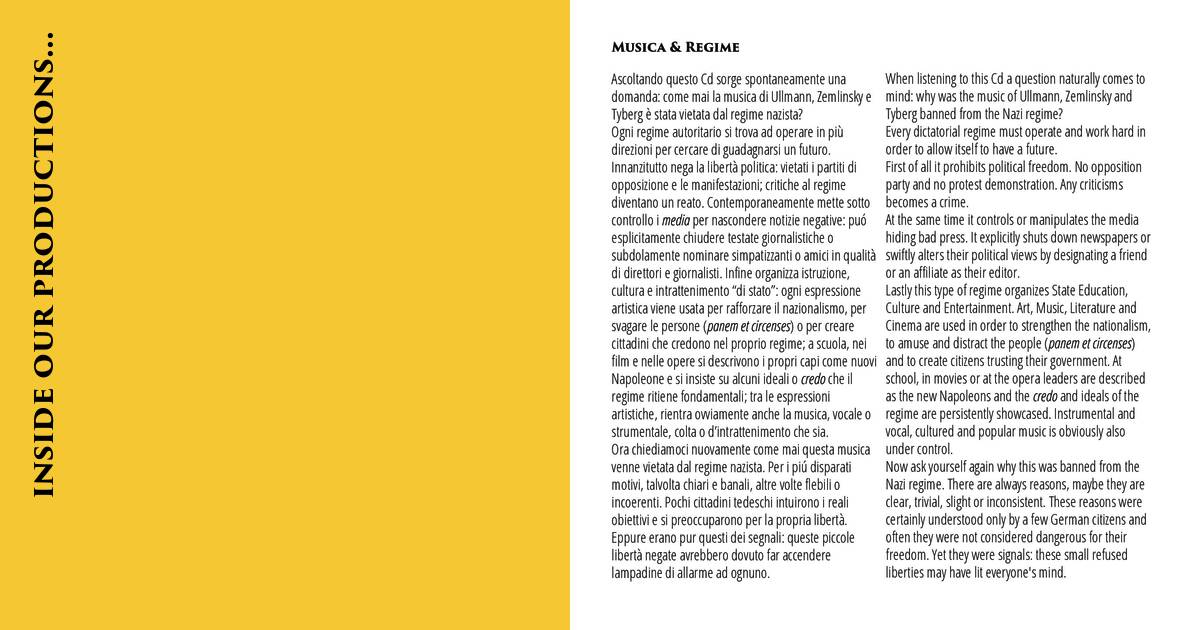
Musica e Regime 3
Musica & Regime
Ascoltando questo Cd sorge spontaneamente una
domanda: come mai la musica di Ullmann, Zemlinsky e
Tyberg è stata vietata dal regime nazista?
Ogni regime autoritario si trova ad operare in più
direzioni per cercare di guadagnarsi un futuro.
Innanzitutto nega la libertà politica: vietati i partiti di
opposizione e le manifestazioni; critiche al regime
diventano un reato. Contemporaneamente mette sotto
controllo i media per nascondere notizie negative: puó
esplicitamente chiudere testate giornalistiche o
subdolamente nominare simpatizzanti o amici in qualità
di direttori e giornalisti. Infine organizza istruzione,
cultura e intrattenimento “di stato”: ogni espressione
artistica viene usata per rafforzare il nazionalismo, per
svagare le persone (panem et circenses) o per creare
cittadini che credono nel proprio regime; a scuola, nei
film e nelle opere si descrivono i propri capi come nuovi
Napoleone e si insiste su alcuni ideali o credo che il
regime ritiene fondamentali; tra le espressioni
artistiche, rientra ovviamente anche la musica, vocale o
strumentale, colta o d’intrattenimento che sia.
Ora chiediamoci nuovamente come mai questa musica
venne vietata dal regime nazista. Per i piú disparati
motivi, talvolta chiari e banali, altre volte flebili o
incoerenti. Pochi cittadini tedeschi intuirono i reali
obiettivi e si preoccuparono per la propria libertà.
Eppure erano pur questi dei segnali: queste piccole
libertà negate avrebbero dovuto far accendere
lampadine di allarme ad ognuno.
When listening to this Cd a question naturally comes to
mind: why was the music of Ullmann, Zemlinsky and
Tyberg banned from the Nazi regime?
Every dictatorial regime must operate and work hard in
order to allow itself to have a future.
First of all it prohibits political freedom. No opposition
party and no protest demonstration. Any criticisms
becomes a crime.
At the same time it controls or manipulates the media
hiding bad press. It explicitly shuts down newspapers or
swiftly alters their political views by designating a friend
or an affiliate as their editor.
Lastly this type of regime organizes State Education,
Culture and Entertainment. Art, Music, Literature and
Cinema are used in order to strengthen the nationalism,
to amuse and distract the people (panem et circenses)
and to create citizens trusting their government. At
school, in movies or at the opera leaders are described
as the new Napoleons and the credo and ideals of the
regime are persistently showcased. Instrumental and
vocal, cultured and popular music is obviously also
under control.
Now ask yourself again why this was banned from the
Nazi regime. There are always reasons, maybe they are
clear, trivial, slight or inconsistent. These reasons were
certainly understood only by a few German citizens and
often they were not considered dangerous for their
freedom. Yet they were signals: these small refused
liberties may have lit everyone's mind.
News,Extra


